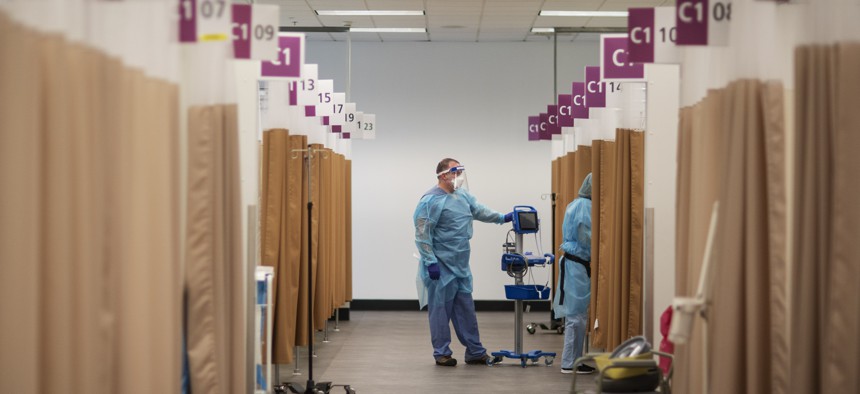Amid Surge in Cases, States Turn to Field Hospitals

A nurse manager stands outside a patient's bed at a field hospital in Cranston, Rhode Island. AP Photo/David Goldman
Health care systems in many states are overwhelmed by the number of Covid-19 patients. Some states are building field hospitals or reopening ones built earlier in the pandemic.
Massachusetts is set to open a 77-bed field hospital on Monday to help relieve the state’s overwhelmed healthcare system, which is dealing with a surge in coronavirus cases. The state isn’t alone—several others have plans to open emergency, temporary hospitals in tents and convention centers, in the hopes that doing so will free up space for critically ill patients.
The field hospital in Lowell, Massachusetts, is built to care for coronavirus patients who are in recovery and need three to five additional days of care from doctors before release. The hospital is expected to have as many as 28 patients by the end of the week. Another field hospital that opened in December in Worcester has already filled 56 of 76 beds.
Hospitalizations in the state are up 129% over last month, when Gov. Charlie Baker announced plans to construct several field hospitals. “Field hospitals play a critical role in our preparedness strategy that helps us alleviate pressure on the health care system generally and enables hospitals to focus on non-Covid patients," he said in December.
Massachusetts is one of several states that has turned to field hospitals in the past few weeks as a strategy for dealing with overwhelmed intensive care units. Field hospitals are operating or will soon open in states like New York, Georgia, Rhode Island, California and North Carolina.
The current surge of Covid-19 cases, which public health experts believe is linked to holiday travel and family gatherings, has outstripped many healthcare systems’ ability to care for critically ill patients. The number of hospitals with intensive care units that are full or nearly full has doubled since October. Now, one in five hospitals is at 95% ICU capacity. Particularly hard hit are hospitals in the South, the East Coast, and southern California.
Hospitals in Los Angeles County are especially overwhelmed. Ambulances have been waiting up to eight hours to offload patients or have been turned away entirely. Some hospitals have resorted to placing patients in gift shops. Doctors in the county say the strain on beds is more pronounced on smaller hospitals.
Several field hospitals are in operation in southern California, some of which are designed to treat patients for non-coronavirus-related injuries and conditions.
In North Carolina, the aid organization Samaritan’s Purse is leading the construction effort of a 30-bed field hospital intended to support five small hospitals in the western part of the state. The temporary emergency hospital will be used for Covid-19 patients who require hospitalization but are not sick enough to need a ventilator.
Franklin Graham, president of Samaritan’s Purse, said the organization has constructed similar tent medical centers around the world during hurricanes, earthquakes and other disasters. “Now, it is needed in our backyard,” he said.
Western North Carolina is in particular need of support right now, said Phil Bridges of UNC Health, the state-owned hospital system. “The current volume of Covid patients has spiked in recent weeks and many of the hospitals in this region are operating at maximum capacity,” he said in a statement. “This spike is expected to sustain or accelerate into February and the additional resources the emergency field hospital will provide can help assure we can address the needs of all patients.”
In addition to newly constructed set ups, some states are also reopening field hospitals that were established earlier in the pandemic and closed when caseloads decreased in summer.
New York Gov. Andrew Cuomo is considering reopening the Javits convention center, which in March was converted to a 2,500-bed hospital. The temporary set up closed in May when state officials determined it was no longer needed.
Georgia this week will reopen for the third time a field hospital housed in an Atlanta convention center, following reports that ten of the state’s 14 hospital districts had 10 or fewer ICU beds and two had no beds.
But even with more beds, state officials warn that the temporary hospitals are not a fix—and without the availability of more doctors and nurses, their effectiveness is limited. Gov. Brian Kemp said “the staffing issue has been the hardest part for any governor … [no] matter what state you’re in.”
Emma Coleman is the assistant editor for Route Fifty.
NEXT STORY: Government Executive Media Group Acquires City & State New York






